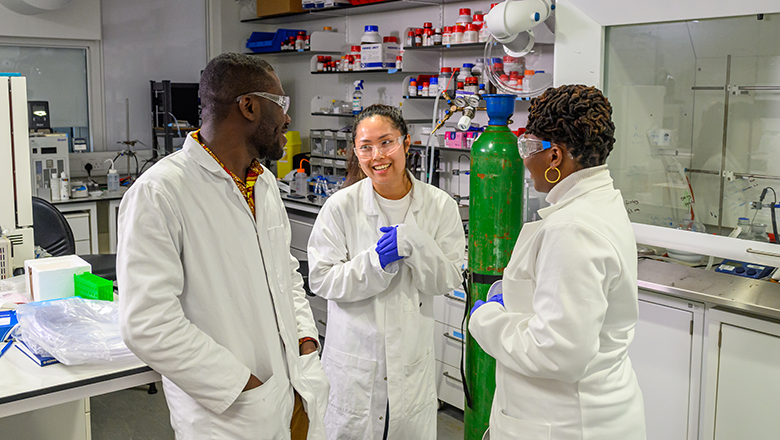“To prepare for the future we need scientists who can work in new ways across scientific frontiers, not only identifying but solving the major challenges facing society. The natural sciences are the foundation for major progress and innovation in scientific discovery, supporting advancements in fields as diverse as engineering and biomedical research.”
Dr Baljinder Mankoo, Reader and School Academic Lead at the School of Basic & Medical Biosciences
17 October 2023
New multidisciplinary natural sciences degree launched at King's
Starting in September 2024, the undergraduate degree aims to empower students to solve major societal challenges at the interface of scientific disciplines

A first-of-its-kind, undergraduate degree in Natural Sciences has been launched by King’s College London, enabling students to study across scientific disciplines. Capitalising on world-class scientific research and education, the degree aims to deliver creative and interdisciplinary teaching focussed on scientific problem solving.
The new degree at King’s will cover the spectrum of natural science subjects (biology, chemistry, mathematics and physics) over the course of three or four years, while also equipping students with key skills for the workplace.
Students can choose between studying a three-year BSc, including the option to study abroad, a four-year BSc with a year in industry, or a four-year MSci degree.
An interdisciplinary approach is essential to solving complex global issues that defy easy categorisation. Clean energy generation and plastic waste disposal, for example, require collaboration across biology, chemistry and physics.
Sitting alongside interdisciplinary institutions within King’s such as the Net Zero Centre and Centre for the Physical Science of Life, the Natural Sciences degree will take a holistic approach to developing cross-disciplinary, innovative and agile thinking amongst graduates, so they are equipped to address pressing global challenges, such as climate change, the transition to Net Zero and the impact of an ageing society.
Students will develop essential skills in self-management and development, including active learning, resilience, stress tolerance and flexibility. There will be opportunities to work within diverse, interdisciplinary teams and engage professionally with partners and staff through collaborative projects.
Alongside this, embedded training in entrepreneurship skills aims to enhance the employability of graduates, preparing them to find employment within emerging and future industries that address major global challenges, including in green growth and sustainability, health and life sciences, digital and data driven economy, as well as national security, defence and space.
Amidst the shortage of STEM skills in the UK, the interdisciplinary approach of the Natural Sciences programme promises not only to provide students with skills and knowledge highly sought by employers, but also a strong baseline of knowledge, that will ready students to work in high-activity areas of the economy.
“To make a difference from day one, we know employers want graduates who can approach problems in ways that straddle multiple disciplines. But beyond making an impact today, students with foundational knowledge across the sciences will have the agility to pivot to the needs of a changing world and a changing job market.”
Professor Rachel Mills, Senior Vice President (Academic)
Applications for the Natural Science degrees are now open, with applications accepted until 31 January 2024.
In this story
Related departments
- Faculty of Natural, Mathematical & Engineering Sciences
- Department of Chemistry
- Faculty of Life Sciences & Medicine
- Department of Chemistry
- Department of Mathematics
- Department of Physics
- School of Cancer & Pharmaceutical Sciences
- School of Immunology & Microbial Sciences
- School of Basic & Medical Biosciences
- School of Cardiovascular and Metabolic Medicine & Sciences
- Centre for Host-Microbiome Interactions (CHMI)
- Faculty of Dentistry, Oral & Craniofacial Sciences
- Centre for Craniofacial & Regenerative Biology
- Employer Engagement


